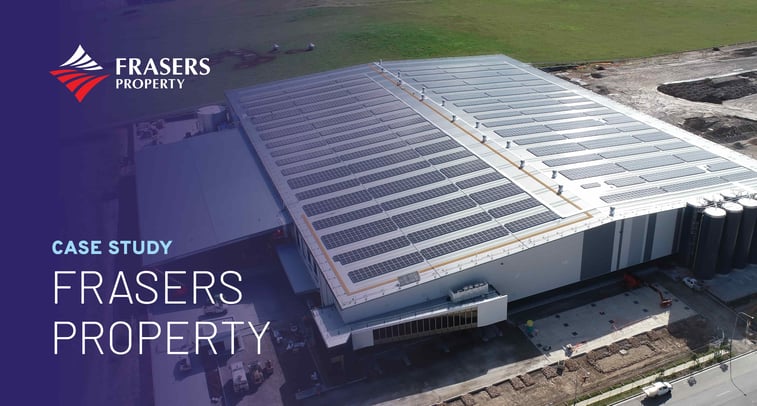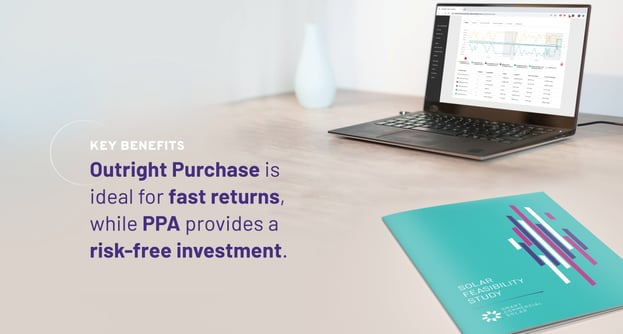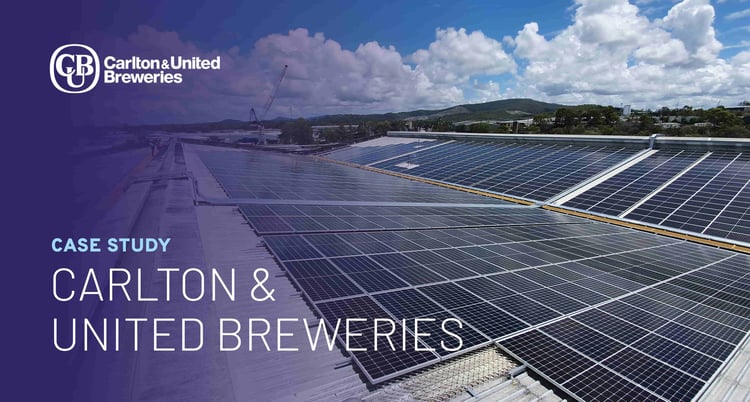In our previous blog, we dove into why commercial solar is a no-brainer in 2022. While we touched on various procurement methods, this time we will be exploring the pros and cons of both an Outright Purchase and a Power Purchase Agreement (PPA) in-depth. We'll also share key insights from case studies on both procurement methods.
PROS of an Outright Purchase
The biggest attraction of purchasing your solar installation outright is that you fully own the system from the beginning. Since it's purchased upfront, there are no ongoing payments and you can even leverage the asset as a key selling feature if you decide to move on from the premises at a later time.
Most customers can expect a break even on their solar investment between three to six years from purchase. As you save money off your energy bills, you are ultimately paying off the capital costs of the system. So for a product that offers a 30-year design life, the break-even period is comparatively short.
The average return is approximately 18% per annum, and the savings on your energy bills translate to an effective return on investment range of 15-30% as a comparative interest rate - meaning you get to enjoy a cash-positive investment from day one. Depreciation also allows you to claim tax discounts, increasing your ROI from the system.
Finally, you'll receive the full financial benefit from your solar installation. As the operational and maintenance costs are low, you'll have no other financial obligations and your benefits will be realised immediately - on every bill.
CONS of an Outright Purchase
An Outright Purchase may not be the ideal solution for every commercial client. For example, most business owners aren't experts in the solar field, and therefore won't have the requisite knowledge to verify the quality of the materials they are purchasing. Are you really buying high-quality products, and will they perform as specified?
If the system fails to perform as expected, the onus - and the financial cost of repair or replacement - falls to you. Every industry has questionable operators, and we are aware of some instances where customers have bought a system based on inflated figures, which meant their true ROI was nowhere near what they expected.
There's also the issue of competing capital. While commercial solar is an excellent way to reduce your energy bills while supporting a more sustainable environment, some businesses may find better returns on investment compared to an Outright Purchase of their solar system.
Outright Purchase - case study
Fraser's Property engaged Smart Commercial Solar to deploy a large-scale solar solution across three sites in New South Wales and Victoria. Their business is well set up to understand the operational requirements of solar assets, as they had been installing solar on their sites for many years already.
Fraser's was looking for the best-quality installation that would deliver the fastest returns for their business, which is why an Outright Purchase made the most sense. Ultimately, they received 2.25MW rooftop solar, 700kWh battery storage, and 750kVA biodiesel genset.
PROS of a Power Purchase Agreement
For PPAs, the main attraction is the $0 paid upfront. As there's no capital purchase required, you can spend your cash elsewhere in the business while still getting all the benefits of commercial solar. Your normal energy bills will drop relative to your solar production, and the solar-power energy is generally cheaper than the cost of grid power. Usually, you can expect to save around 10% off your energy bills immediately.
PPAs don't appear as debt on your balance sheets, which means you aren't reducing your overall borrowing capacity. And since it's an operational expense, all payments for the energy produced are based on actual generation. Then there's the benefit of tax deductible operational costs.
Unlike an Outright Purchase, you are completely protected against performance and operational risks. If a component fails or underperforms, we take care of everything for you. Smart Commercial Solar looks after your system until handover, and we make repairs at our own cost. Bottom line? No capital risk, no performance risk, and no product risk.
We take pride in having the shortest and most flexible PPA plans on the market, with an average span of five to ten years. You can also choose to buy out your plan anytime - so if you want, you can exit your contract without being penalised and enjoy all the benefits of significantly reduced energy costs much sooner.
To top things off, our PPAs include zero maintenance costs. We own the system and we want it to generate power reliably. That's why we take care in operating and maintaining the system at no additional cost to you.

CONS of a PPA
If there's one drawback to a Power Purchase Agreement, it's what happens if you need to move away from the site. If you choose to leave the premises where solar is installed, you will either need to exercise the buyout of the system or transfer the contract over to the new tenant or building owner.
Fortunately Smart Commercial Solar can assist you in the novation of the agreement, or manage the 'make good' obligations under your tenancy. This is an area we have lots of experience in, so any tenant looking to install solar under a PPA has comfort in knowing Smart Commercial Solar will be there to assist.
Power Purchase Agreement (PPA) - case study
Carlton & United Breweries (CUB) engaged Smart Commercial Solar in what would be our largest commercial fixed-price PPA project so far. Solar was rolled out across three sites in Yatala, Abbotsford, and Wulkuraka, with Yatala being the fifth-largest solar system in Australia (5.35MW).
CUB chose to go with a 20-year fixed price PPA arrangement because they didn't want to spend their capital on non-core business assets. We provided the solution and now they get to enjoy the benefits of cheaper electricity.
If you are ready to make the switch to commercial solar, we can get you started straight away with a feasibility assessment.
You can also get the latest news and find out what's happening in the commercial solar space at Smart Insights.




